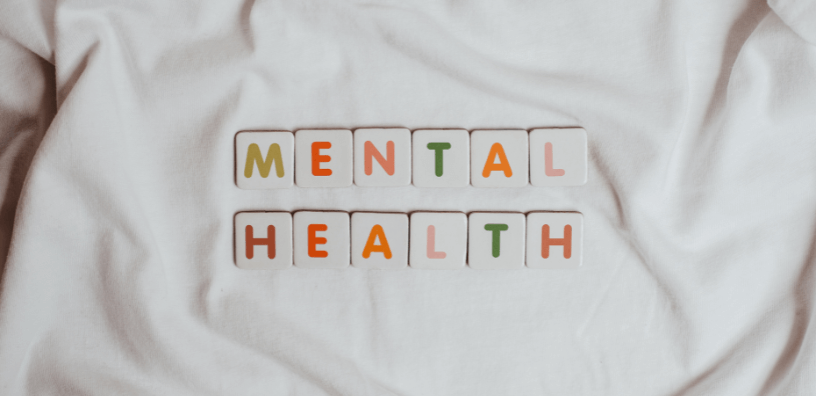
Better Sleep, Better Mind: How Rest Impacts Mental Health
May is Mental Health Awareness Month—a perfect time to hit pause and ask: How’s your mind really doing?
Millions struggle daily, yet stigma and misconceptions often prevent people from seeking help. Many people don’t realize that sleep plays a powerful role in mental well-being, and as you age, it becomes even more essential. Unfortunately, mental health struggles can make quality sleep harder to achieve, creating a frustrating cycle of exhaustion and stress.
The good news? It’s possible to break the cycle of poor sleep quality. By understanding the deep connection between sleep and mental health, and implementing simple, effective tips, you can learn how to sleep better naturally. Let’s dive in!
Why Sleep & Mental Health Are Deeply Connected
Ever notice how everything feels harder after a bad night’s sleep? You’re not imagining it, sleep is one of the most important yet overlooked aspects of mental health. When you’re running on empty, it’s harder to manage stress, stay positive, or think clearly. And you’re not alone, over one-third of adults in the U.S. don’t get enough sleep.[1]
But here’s the real kicker: sleep and mental health have a two-way relationship. Poor sleep doesn’t just make you groggy; it can seriously affect your mental health. In fact, people with insomnia are nearly 10x more likely to experience depression and 17x more likely to develop anxiety than those who sleep well.[2]

The Science of Sleep & Mental Wellness
The connection between sleep and emotional wellness is complex, but here’s a simple breakdown of how sleep affects mental health, brain chemistry, and mood:
-
Cortisol Levels: As you drift into sleep, cortisol (the stress hormone) naturally decreases. Poor sleep leads to higher cortisol, which makes you feel more stressed and anxious.[3]
-
Serotonin & Dopamine: These neurotransmitters play a key role in mood regulation. Sleep helps balance serotonin and dopamine, promoting positive emotions and a stable mood. Poor sleep disrupts this balance, contributing to feelings of sadness and irritability.[4]
The Impacts of Aging
Getting older often means saying goodbye to those solid nights of uninterrupted sleep. Hormonal shifts, like a drop in melatonin, can throw off your internal clock, making sleep feel lighter, shorter, and far less satisfying.[5,6] Add in common age-related health issues or medications, and it’s no wonder many older adults find themselves battling a disrupted circadian rhythm and mental health struggles.[6]
REM Sleep for Mental Stability
REM, or Rapid Eye Movement, is the deepest stage of the sleep cycle. Your eyes flutter rapidly as your brain dreams, processes emotions and thoughts, finds mental renewal, and develops.
Sounds intense, right? A lot is happening during this stage, so if you aren’t getting REM sleep, you’re missing out on quite a few critical benefits. This is why the quality of your sleep is more important than how much sleep you get—8 hours isn't enough if you wake up a lot throughout the night or don't sleep deeply.
If you’re looking to improve sleep and emotional well-being, aim for at least 2 hours of deep sleep (REM). Keep in mind, conditions like depression or anxiety tend to drastically shorten REM sleep and further intensify mental health issues, worsening overall sleep.[7]
Feeling a little deflated after learning this? Don’t worry, we’ve got you covered. In the next section, you’ll learn how to spot the signs of poor sleep and uncover practical solutions to break the cycle, sleep better, and reclaim your energy!

Do You Have Any of These Poor Sleep Signs?
Feeling tired all day is the first clue you’re running on empty, but poor sleep quality shows up in other ways, too.
It’s time for a self-evaluation. Look over this list and see if any of these symptoms sound familiar:[8]
-
Difficulty falling or staying asleep.
-
Waking up feeling exhausted.
-
Slow reaction time and decision-making
-
Experiencing frequent brain fog or forgetfulness.
-
Mood swings, irritability, or increased anxiety.
-
Heightened stress responses and feeling overwhelmed easily.
*If you notice any of these signs, consult a healthcare professional.

5 Sleep Hygiene Tips for Better Rest & Mental Wellness
Here are 5 ways to improve sleep quality for a healthy, stress-free mind:
1. Establish a Consistent Sleep Routine
Whether you’re a busy young adult juggling multiple jobs or a retiree adjusting to a new pace of life, your ideal bedtime should align with your lifestyle. There’s no perfect bedtime, but having a consistent routine supports your circadian rhythm and mental health.[9] Soon, you may no longer need an alarm clock!
Instead, try this:
- Go to bed and wake up at the same time every day (yes, even on weekends!).
-
Limit naps to 20–30 minutes during the day, longer naps can throw off nighttime sleep.[10]
2. Create a Cool & Relaxing Sleep Environment
The comfort (or discomfort) of your space affects how easily your brain powers down. Bright lights, warm temps, and stiff bedding can keep you from settling into deep rest.
Here’s how to set the scene:
- Keep your room cool, dark, and quiet. Blackout curtains or a white noise machine can help.
- Avoid screens and harsh lighting before bed.
Don’t Underestimate Breathable Bedding
Cooling bedding is king! Sleeping on the wrong material can trigger night sweats and disrupted sleep.
Here are some cooling bedding recommendations to keep your body’s temperature regulated throughout the night:
-
100% Bamboo Sheets + Pillowcases: The naturally moisture-wicking properties of pure bamboo viscose will help keep you cool and relaxed while being silky soft and smooth—ideal for those with sensitive skin.
-
Luxury Comforter + Ultra-Soft Duvet Covers: The duvet cover, made of a silky-soft and moisture-wicking bamboo viscose blend, promotes airflow for a cool and comfortable sleep. It also protects the fluffy comforter insert, which adapts to your body temperature to keep you snug.
-
Luxury Mattress Protector: Add another layer of cooling comfort to your mattress with a naturally hypoallergenic and waterproof mattress protector, designed for maximum freshness and long-lasting freshness.
3. Reduce Blue Light Exposure Before Bed
Melatonin is the body’s natural sleep aid hormone that helps you quickly drift into la-la land.
Unfortunately, blue light from phones, TVs, and computers is melatonin’s biggest enemy, suppressing it, making it harder to sleep.
Ways to improve sleep quality:
- Power down screens 1–2 hours before bed.
- Use blue light filters on your devices.
- Try blue light-blocking glasses for unavoidable screen time.[11,12]
4. Try Relaxation Techniques for Better Sleep
When stress builds up, your body forgets how to relax. At first, letting go might feel uncomfortable, but like anything else, it gets easier with practice.
Here are some of the best sleep tips for anxiety:
- Meditate or do deep breathing exercises.
- Use therapeutic-grade essential oils in an ultrasonic diffuser to set a calming mood.
- Try gentle stretching or bedtime yoga to signal your body it’s time to wind down.[13]
5. Incorporate Nutrients That Support Sleep & Mental Health
While supplementation and holistic remedies can be powerful ways to improve sleep for stress relief, think of them as the finishing touch, not the whole picture. They work best when paired with other healthy habits.
Here are some of the most well-researched options:
- Magnesium: Calms the nervous system and promotes deep, restorative sleep.[14]
- Melatonin: Helps your brain recognize when it’s time to rest.[15] This Sleep + Restore Blend combines magnesium, melatonin, and calming herbs to reduce anxiety and promote sleep.
- Omega-3s: Regulate mood and improve sleep quality by supporting brain health.[16]
- Herbal Teas: Chamomile and valerian root help calm the nervous system and prep your body for sleep.[17,18]

Prioritizing Sleep for a Healthier Mind
This Mental Health Awareness Month, commit to prioritizing your rest—because quality sleep is key to emotional well-being.
You’ve seen how lack of sleep affects mood and how the connection between sleep and mental health goes both ways. Small, realistic changes—like consistent routines, relaxing nighttime habits, and supportive products like Cosy House bedding, calming teas, and science-backed supplements—can make a big difference. Start today and explore Cosy House’s sleep-friendly products that support a healthier, more rested you.
To shop our collection & get 10% OFF, use the code 'BLOG10' at checkout!
—
References:
-
Pankowska MM, Lu H, Wheaton AG, Liu Y, Lee B, Greenlund KJ, et al. Prevalence and Geographic Patterns of Self-Reported Short Sleep Duration Among US Adults, 2020. Prev Chronic Dis 2023;20:220400. DOI: http://dx.doi.org/10.5888/pcd20.220400
-
Taylor, D. J., Lichstein, K. L., Durrence, H. H., Reidel, B. W., & Bush, A. J. (2005). Epidemiology of insomnia, depression, and anxiety. Sleep, 28(11), 1457–1464. https://doi.org/10.1093/sleep/28.11.1457
-
Leproult, R., Copinschi, G., Buxton, O., & Van Cauter, E. (1997). Sleep loss results in an elevation of cortisol levels the next evening. Sleep, 20(10), 865–870.
-
Monti, J. M., & Jantos, H. (2008). The roles of dopamine and serotonin, and of their receptors, in regulating sleep and waking. Progress in brain research, 172, 625–646. https://doi.org/10.1016/S0079-6123(08)00929-1
-
Li, J., Vitiello, M. V., & Gooneratne, N. S. (2018). Sleep in Normal Aging. Sleep medicine clinics, 13(1), 1–11. https://doi.org/10.1016/j.jsmc.2017.09.001
-
Campos Costa, I., Nogueira Carvalho, H., & Fernandes, L. (2013). Aging, circadian rhythms and depressive disorders: a review. American journal of neurodegenerative disease, 2(4), 228–246.
-
McNamara, P., Auerbach, S., Johnson, P., Harris, E., & Doros, G. (2010). Impact of REM sleep on distortions of self-concept, mood and memory in depressed/anxious participants. Journal of affective disorders, 122(3), 198–207. https://doi.org/10.1016/j.jad.2009.06.030
-
Chattu, V. K., Manzar, M. D., Kumary, S., Burman, D., Spence, D. W., & Pandi-Perumal, S. R. (2018). The Global Problem of Insufficient Sleep and Its Serious Public Health Implications. Healthcare (Basel, Switzerland), 7(1), 1. https://doi.org/10.3390/healthcare7010001
-
McMahon, W. R., Ftouni, S., Phillips, A. J. K., Beatty, C., Lockley, S. W., Rajaratnam, S. M. W., Maruff, P., Drummond, S. P. A., & Anderson, C. (2020). The impact of structured sleep schedules prior to an in-laboratory study: Individual differences in sleep and circadian timing. PloS one, 15(8), e0236566. https://doi.org/10.1371/journal.pone.0236566
-
Your guide to healthy sleep. National Heart, Lung, and Blood Institute. https://www.nhlbi.nih.gov/resources/your-guide-healthy-sleep. Accessed May 15, 2024.
-
Silvani, M. I., Werder, R., & Perret, C. (2022). The influence of blue light on sleep, performance and wellbeing in young adults: A systematic review. Frontiers in physiology, 13, 943108. https://doi.org/10.3389/fphys.2022.943108
-
Hester, L., Dang, D., Barker, C. J., Heath, M., Mesiya, S., Tienabeso, T., & Watson, K. (2021). Evening wear of blue-blocking glasses for sleep and mood disorders: a systematic review. Chronobiology international, 38(10), 1375–1383. https://doi.org/10.1080/07420528.2021.1930029
-
Mohammad, A., Elham, H., & Andreas, K. (2024). A scoping review of the effect of chronic stretch training on sleep quality in people with sleep disorders. European journal of applied physiology, 124(9), 2533–2545. https://doi.org/10.1007/s00421-024-05541-z
-
Cao, Y.; Zhen, S.; Taylor, A.W.; Appleton, S.; Atlantis, E.; Shi, Z. Magnesium Intake and Sleep Disorder Symptoms: Findings from the Jiangsu Nutrition Study of Chinese Adults at Five-Year Follow-Up. Nutrients 2018, 10, 1354. https://doi.org/10.3390/nu10101354
-
Masters, A., Pandi-Perumal, S. R., Seixas, A., Girardin, J. L., & McFarlane, S. I. (2014). Melatonin, the Hormone of Darkness: From Sleep Promotion to Ebola Treatment. Brain disorders & therapy, 4(1), 1000151. https://doi.org/10.4172/2168-975X.1000151
-
Association of omega-3 levels and sleep in US adults, National Health and Nutrition Examination Survey, 2011-2012 Murphy, Rachel A. et al. Sleep Health: Journal of the National Sleep Foundation, Volume 8, Issue 3, 294 - 297
-
Shinjyo, N., Waddell, G., & Green, J. (2020, October). Valerian Root in Treating Sleep Problems and Associated Disorders—A Systematic Review and Meta-Analysis. SAGE Journals. Retrieved from https://journals.sagepub.com/doi/10.1177/2515690X20967323
-
Srivastava, J.K., Shankar, E., & Gupta, S. (2010). Chamomile: A herbal medicine of the past with a bright future (Review). Molecular Medicine Reports, 3, 895-901. https://doi.org/10.3892/mmr.2010.377


